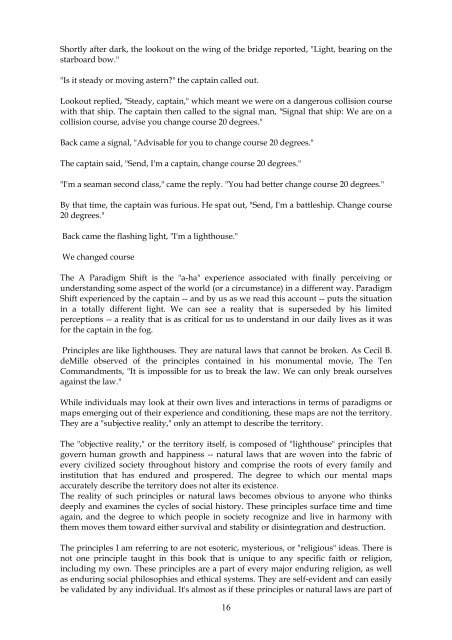Covey - The 7 habits of highly effective people
You also want an ePaper? Increase the reach of your titles
YUMPU automatically turns print PDFs into web optimized ePapers that Google loves.
Shortly after dark, the lookout on the wing <strong>of</strong> the bridge reported, "Light, bearing on the<br />
starboard bow."<br />
"Is it steady or moving astern?" the captain called out.<br />
Lookout replied, "Steady, captain," which meant we were on a dangerous collision course<br />
with that ship. <strong>The</strong> captain then called to the signal man, "Signal that ship: We are on a<br />
collision course, advise you change course 20 degrees."<br />
Back came a signal, "Advisable for you to change course 20 degrees."<br />
<strong>The</strong> captain said, "Send, I'm a captain, change course 20 degrees."<br />
"I'm a seaman second class," came the reply. "You had better change course 20 degrees."<br />
By that time, the captain was furious. He spat out, "Send, I'm a battleship. Change course<br />
20 degrees."<br />
Back came the flashing light, "I'm a lighthouse."<br />
We changed course<br />
<strong>The</strong> A Paradigm Shift is the "a-ha" experience associated with finally perceiving or<br />
understanding some aspect <strong>of</strong> the world (or a circumstance) in a different way. Paradigm<br />
Shift experienced by the captain -- and by us as we read this account -- puts the situation<br />
in a totally different light. We can see a reality that is superseded by his limited<br />
perceptions -- a reality that is as critical for us to understand in our daily lives as it was<br />
for the captain in the fog.<br />
Principles are like lighthouses. <strong>The</strong>y are natural laws that cannot be broken. As Cecil B.<br />
deMille observed <strong>of</strong> the principles contained in his monumental movie, <strong>The</strong> Ten<br />
Commandments, "It is impossible for us to break the law. We can only break ourselves<br />
against the law."<br />
While individuals may look at their own lives and interactions in terms <strong>of</strong> paradigms or<br />
maps emerging out <strong>of</strong> their experience and conditioning, these maps are not the territory.<br />
<strong>The</strong>y are a "subjective reality," only an attempt to describe the territory.<br />
<strong>The</strong> "objective reality," or the territory itself, is composed <strong>of</strong> "lighthouse" principles that<br />
govern human growth and happiness -- natural laws that are woven into the fabric <strong>of</strong><br />
every civilized society throughout history and comprise the roots <strong>of</strong> every family and<br />
institution that has endured and prospered. <strong>The</strong> degree to which our mental maps<br />
accurately describe the territory does not alter its existence.<br />
<strong>The</strong> reality <strong>of</strong> such principles or natural laws becomes obvious to anyone who thinks<br />
deeply and examines the cycles <strong>of</strong> social history. <strong>The</strong>se principles surface time and time<br />
again, and the degree to which <strong>people</strong> in society recognize and live in harmony with<br />
them moves them toward either survival and stability or disintegration and destruction.<br />
<strong>The</strong> principles I am referring to are not esoteric, mysterious, or "religious" ideas. <strong>The</strong>re is<br />
not one principle taught in this book that is unique to any specific faith or religion,<br />
including my own. <strong>The</strong>se principles are a part <strong>of</strong> every major enduring religion, as well<br />
as enduring social philosophies and ethical systems. <strong>The</strong>y are self-evident and can easily<br />
be validated by any individual. It's almost as if these principles or natural laws are part <strong>of</strong><br />
16


